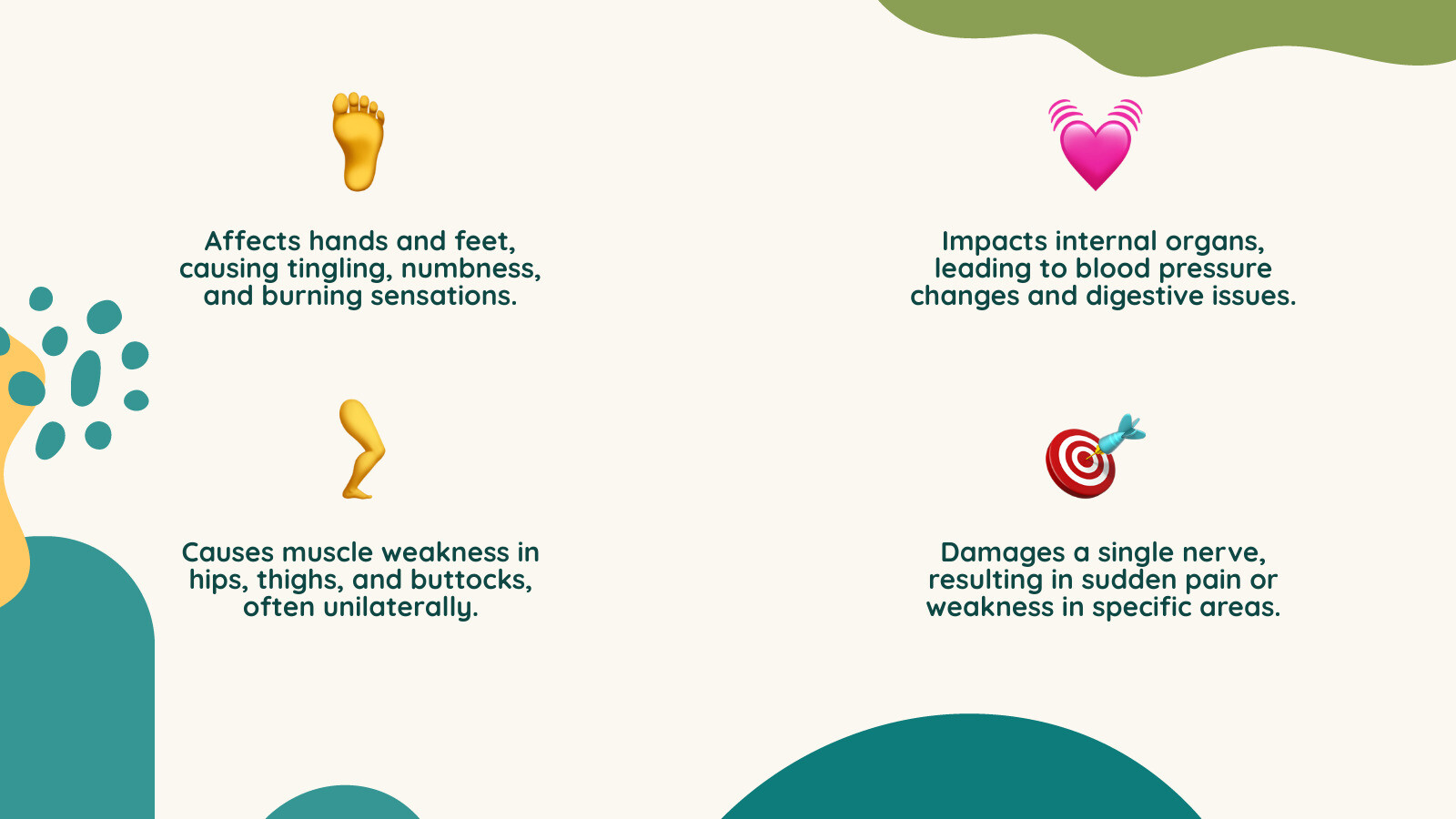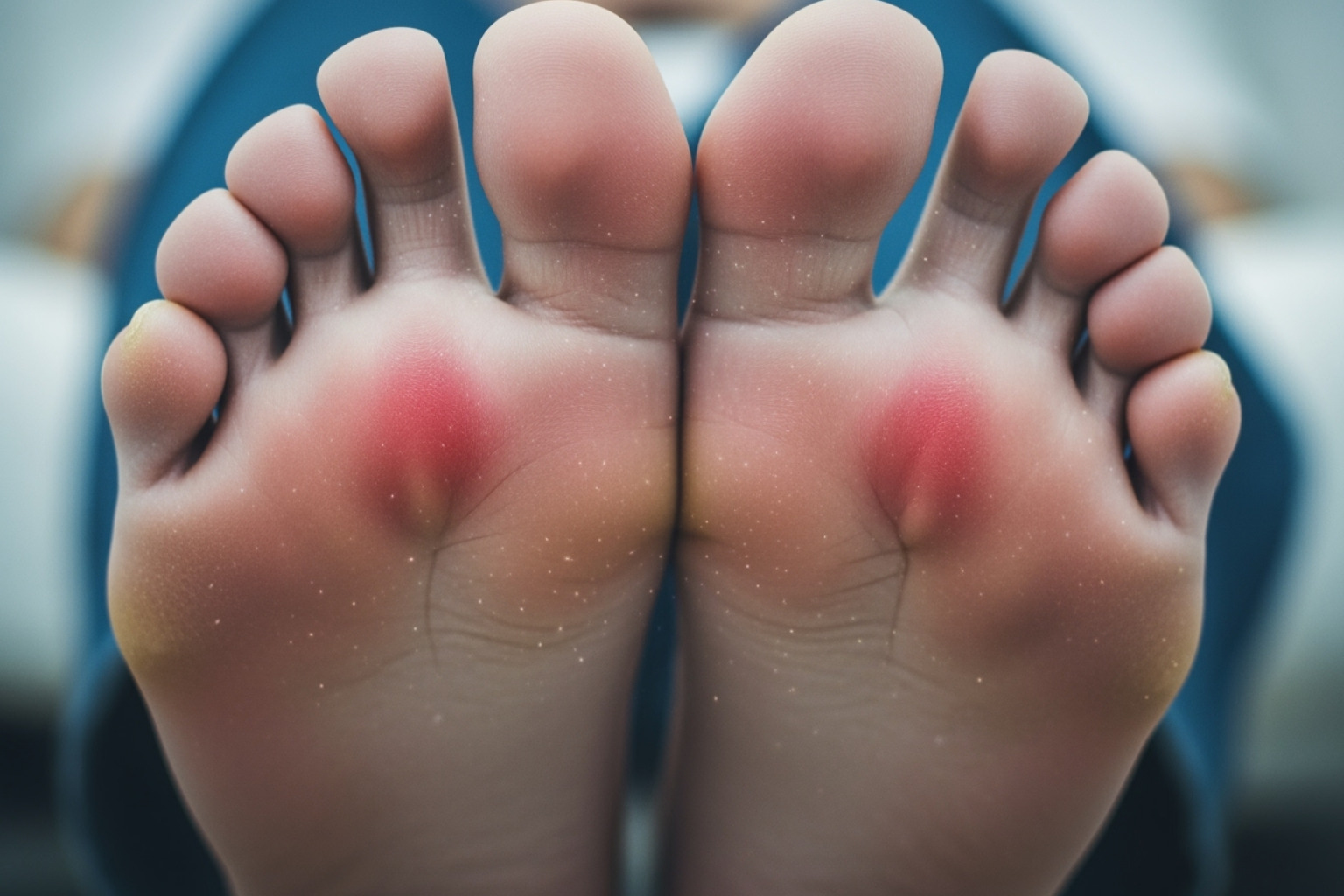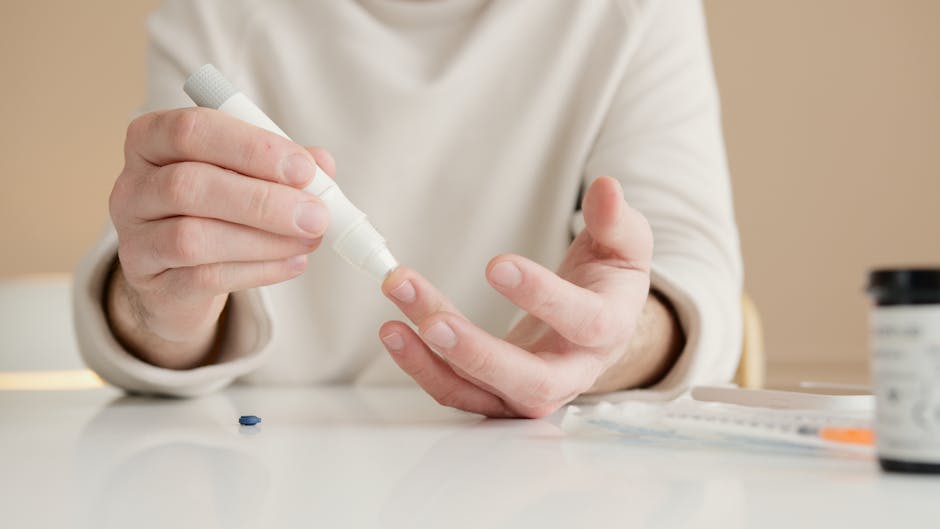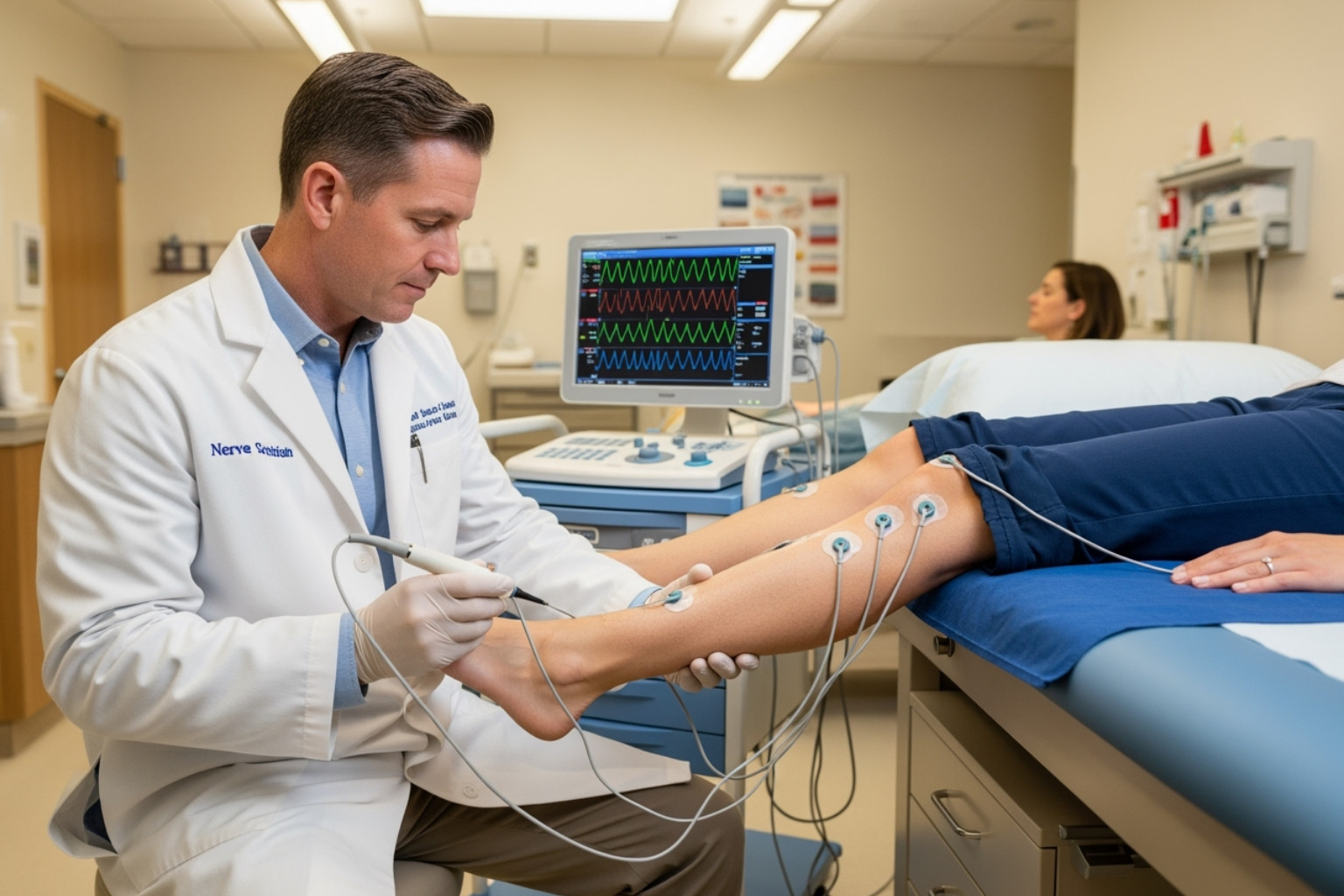What You Need to Know About Nerve Damage
Neuropathy is nerve damage that causes tingling, numbness, burning pain, and weakness, typically starting in the hands and feet. It occurs when peripheral nerves—the network outside your brain and spinal cord—are damaged. While it affects millions, understanding its causes and management strategies can help you regain control.
Quick Facts About Neuropathy:
- What it is: Damage to peripheral nerves that disrupts signals between the brain and body.
- Who it affects: Approximately 20 million Americans.
- Common symptoms: Numbness, tingling, burning pain, muscle weakness, and poor coordination.
- Leading cause: Diabetes, affecting about 50% of people with the condition.
- Key types: Peripheral, autonomic, proximal, and focal neuropathy.
- Management: Treating the root cause, lifestyle changes, and targeted relief.
Neuropathy isn't a single disease but an umbrella term for conditions where nerves malfunction. The damage can be gradual or sudden, affecting one or many nerves. Chronic nerve pain can disrupt sleep, limit mobility, and impact your quality of life, making everyday activities a challenge.
I'm Tony Enrico, and I created Neuropasil after witnessing how debilitating neuropathy can be. This guide will break down what you need to know to manage symptoms and protect your well-being.

Understanding Neuropathy: Types, Symptoms, and Impact
Your nervous system is the body's electrical grid. The brain and spinal cord are the power plant, and nerves are the wires carrying signals everywhere. Neuropathy is like having frayed wires—communication breaks down, and symptoms appear.
The symptoms you experience depend on which nerves are damaged. Your peripheral nervous system has three main types:
- Sensory nerves relay information about pain, temperature, and touch. Damage can cause numbness, tingling, or burning sensations.
- Motor nerves control muscle movement. Damage leads to weakness, cramping, and poor coordination, making simple tasks difficult.
- Autonomic nerves manage automatic functions like heart rate, blood pressure, and digestion. Malfunctions can cause digestive issues, dizziness, and bladder problems.

The Main Types of Neuropathy
Neuropathy is an umbrella term for several forms of nerve damage:
- Peripheral neuropathy is the most common type, affecting nerves outside the brain and spinal cord. It usually starts in the longest nerves, which is why symptoms often appear in the feet and hands first. Learn more in our guide on peripheral neuropathy symptoms.
- Autonomic neuropathy affects nerves controlling automatic bodily functions, leading to issues with heart rate, blood pressure, and digestion.
- Proximal neuropathy is a less common type that causes pain and weakness in the hips, buttocks, and thighs, usually on one side of the body.
- Focal neuropathy (or mononeuropathy) involves damage to a single nerve, often from compression. Carpal tunnel syndrome is a well-known example.
- Polyneuropathy occurs when multiple nerves throughout the body malfunction simultaneously, accounting for most peripheral neuropathy cases.
Common Symptoms of Peripheral Neuropathy
Symptoms often begin gradually. You might notice a slight tingling in your toes that you dismiss, but it can intensify over time.
- Numbness and tingling are often the first signs, creating a “pins-and-needles” sensation that doesn’t go away.
- Burning pain, especially in the feet, is a hallmark symptom that can disrupt sleep and make wearing shoes uncomfortable.
- Sharp, jabbing, or electric shock-like sensations can occur suddenly and without warning.
- Extreme sensitivity (allodynia) can make even the lightest touch, like bedsheets, feel painful.
- Muscle weakness develops when motor nerves are affected, leading to clumsiness, difficulty with fine motor skills, and an unsteady gait.
- Lack of coordination and balance problems increase the risk of falls, especially in low light.
- For those with diabetes, diabetic foot pain combines pain with numbness, making it hard to notice injuries that could lead to serious complications.
Autonomic Neuropathy Symptoms
When autonomic nerves are damaged, your body's automatic systems can misfire.
- Blood pressure changes may cause dizziness or lightheadedness upon standing (orthostatic hypotension).
- Digestive issues like bloating, nausea, constipation, or diarrhea are common.
- Bladder problems, such as difficulty emptying the bladder or incontinence, can occur.
- Sweating issues can include excessive sweating or an inability to sweat, leading to heat intolerance.
The Root Causes and Risk Factors of Neuropathy
Understanding the cause of neuropathy is key to managing it. Causes are often divided into acquired (developed during your lifetime) and inherited (passed down genetically). Dozens of factors can contribute, including lifestyle, health conditions, and environmental exposures.

Diabetes: The Leading Cause
Diabetes is the single most common cause of nerve damage, a condition known as diabetic neuropathy. About 50% of people with diabetes will develop some form of it, and it accounts for roughly 30% of all neuropathy cases.
High blood sugar levels damage the small blood vessels that supply nerves with oxygen and nutrients. Over time, this starves the nerves, causing them to malfunction and eventually die. The greatest risk factor is poorly controlled blood sugar. The longer you have diabetes and the less controlled your glucose is, the higher your risk. For more details, see information on diabetic neuropathies from NIDDK and our guide on 7 proven diabetic neuropathy treatments.
Other Major Causes and Risk Factors
While diabetes is dominant, many other factors can cause neuropathy:
- Autoimmune diseases: Conditions like lupus, rheumatoid arthritis, and Guillain-Barré syndrome cause the immune system to attack nerves.
- Infections: Viruses (shingles, HIV, hepatitis C) and bacteria (Lyme disease) can directly damage the nervous system.
- Tumors: Cancerous or benign growths can press on nerves. Some cancers also trigger an immune attack on nerves.
- Vitamin deficiencies: A lack of B vitamins (especially B1, B6, B12), copper, and vitamin E can harm nerve health. Conversely, excessive vitamin B6 can be toxic to nerves.
- Chemotherapy: Certain cancer-fighting drugs can cause nerve damage, a side effect known as chemotherapy-induced peripheral neuropathy (CIPN).
- Alcohol abuse: Chronic heavy drinking is toxic to nerve tissue and often leads to nutritional deficiencies that worsen the damage.
- Kidney or liver disease: These conditions allow toxins to build up in the blood, which can damage nerves.
- Physical injury: Trauma, repetitive motions, or sustained pressure can compress or damage nerves, leading to conditions like carpal tunnel syndrome.
- Exposure to toxins: Heavy metals (lead, mercury) and industrial chemicals can poison nerves.
- Hereditary conditions: Genetic disorders like Charcot-Marie-Tooth disease predispose some people to nerve damage.
- Idiopathic neuropathy: In about 30% of cases, the cause remains unknown despite extensive testing. While frustrating, management is still possible.
Diagnosis, Treatment, and Managing Nerve Pain
If you suspect you have neuropathy, seeking an early diagnosis is crucial for managing symptoms and slowing progression. Your primary care doctor may refer you to a neurologist, a specialist in nervous system disorders.

How Neuropathy is Diagnosed
Diagnosing neuropathy involves a comprehensive approach. It begins with a detailed discussion of your medical history and symptoms, followed by a physical and neurological exam to check reflexes, muscle strength, and sensation. To identify the cause and extent of damage, your doctor may use several tests:
- Blood tests to detect diabetes, vitamin deficiencies, autoimmune diseases, or infections.
- Nerve conduction velocity (NCV) tests to measure how quickly electrical signals travel through your nerves.
- Electromyography (EMG) to evaluate the electrical activity in your muscles.
- Nerve or skin biopsy to examine a small tissue sample for signs of nerve damage.
- Imaging tests like MRI or CT scans to identify structural issues like tumors or compressed nerves.
Approaches for Neuropathy Pain Relief
Management focuses on treating the underlying cause, if possible, and relieving symptoms. For many, symptom management is key to maintaining quality of life.
Living with constant burning, tingling, or numbness is exhausting. That’s why we created Neuropasil nerve pain relief cream. Our formula delivers fast-acting, soothing relief directly to the source of discomfort. It combines powerful natural ingredients like Aloe, Urea, and Menthol to nourish inflamed nerves, absorbing quickly without a greasy feel. Neuropasil provides targeted topical relief to help you reclaim your day from diabetic neuropathy, sciatica, or general nerve pain. Learn more about nerve pain relief with Neuropasil.
In addition to topical solutions, physical and occupational therapy can improve strength, balance, and coordination, helping you maintain independence. Some people also find relief with transcutaneous electrical nerve stimulation (TENS), which uses gentle electrical currents to block pain signals.
Lifestyle Choices for Management and Prevention
Your daily choices can significantly impact neuropathy. A healthy lifestyle is a powerful tool for prevention and management.
- Eat a healthy diet: Focus on fruits, vegetables, whole grains, and lean proteins. Ensure you get enough nerve-protective nutrients like B vitamins, vitamin E, and copper.
- Exercise regularly: Physical activity improves blood flow to nerves, strengthens muscles, improves balance, and can reduce pain. Aim for 30 minutes of moderate activity most days, but consult your doctor first. Movement is key to relieving muscle aches and managing neuropathy.
- Control blood sugar: If you have diabetes, this is the most critical step to prevent or slow nerve damage.
- Avoid alcohol and smoking: Limiting alcohol and quitting smoking prevents further nerve damage and improves circulation.
- Protect your nerves: Use proper ergonomics, wear protective gear during sports, and avoid repetitive motions that can compress nerves.
Living With Neuropathy: Complications and Support Systems
Living with neuropathy affects more than just your physical health; it can impact your independence, confidence, and emotional well-being. Understanding potential complications and knowing where to find support are key to navigating this chronic condition.
Potential Complications
Nerve damage can disable your body's natural warning system, leading to several risks that require proactive care:
- Loss of sensation: Numbness, especially in the feet, means you might not feel minor injuries like cuts, blisters, or pebbles in your shoe. This is a common cause of more serious issues.
- Burns and skin injuries: An inability to sense temperature or pain can lead to accidental burns from hot water, heaters, or kitchen mishaps.
- Infections: Unnoticed cuts or scrapes can easily become infected, especially if circulation is poor. These infections can become serious if not treated promptly.
- Foot ulcers: These open sores can develop from pressure or untreated injuries and are difficult to heal, requiring immediate medical attention.
- Falls: Muscle weakness, poor balance, and numbness create a high risk of falls, which can lead to fractures and other serious injuries.
- Gangrene: In severe cases, untreated infections or ulcers can lead to tissue death, a medical emergency that may require amputation. Early intervention for issues like heel pain is critical.
Finding Resources and Support
The emotional burden of a chronic condition can be heavy, but you don't have to face it alone. Support is essential for your well-being.
- Patient education: Knowledge is power. Reputable sources like the National Institute of Neurological Disorders and Stroke provide credible information to help you make informed decisions.
- Your healthcare team: Work closely with your doctors, physical therapists, and dietitians. They are your primary support system for managing your health.
- Support groups and online communities: Connecting with others who understand your experience can be incredibly valuable. Organizations like the Foundation for Peripheral Neuropathy offer resources, community, and hope.
With the right medical care, self-management, and community support, you can maintain your quality of life. Neuropathy is a condition you manage—it doesn't have to define you.
Frequently Asked Questions about Neuropathy
When dealing with neuropathy, questions are natural. Here are straightforward answers to some of the most common ones.
Can neuropathy be cured or reversed?
While there is no universal cure for neuropathy, the potential for improvement or reversal depends on the cause. If nerve damage stems from a treatable issue like a vitamin B12 deficiency or an infection, addressing the root cause can lead to significant recovery. In early-stage diabetic neuropathy, strict blood sugar control can halt progression and sometimes reverse symptoms.
For many, however, the damage is permanent, and the focus shifts to symptom management and preventing further progression. Nerve regeneration is possible but is often slow and incomplete. The key is early diagnosis and consistent management.
Does exercise help with neuropathy?
Yes, absolutely. Regular exercise is one of the most beneficial therapies for neuropathy. It improves blood circulation to nerves, strengthens muscles to improve stability, and improves balance to reduce fall risk. Exercise also triggers the release of endorphins, the body's natural painkillers, which can help reduce burning and tingling sensations.
Gentle activities like walking, swimming, and yoga are excellent choices. Always talk to your doctor or a physical therapist before starting a new exercise program to ensure it's safe and effective for you.
Is neuropathy always painful?
No, pain is not a universal symptom. While many people experience intense burning, shooting, or stabbing pain, others primarily feel numbness, tingling, or a complete loss of sensation. The absence of pain can be equally dangerous, as it increases the risk of unnoticed injuries, especially on the feet.
Symptoms depend on which nerve fibers are damaged. Small-fiber damage often causes pain, while large-fiber damage tends to cause numbness and balance issues. Your management plan should be custom to your specific symptoms, whether it's managing pain or protecting numb areas from injury.
Conclusion
Living with neuropathy is a daily journey. We've explored its types, symptoms, causes, and the diagnostic process. While neuropathy affects approximately 20 million Americans, each person's experience is unique, ranging from burning pain to debilitating numbness.
Remember this: understanding your condition is the first step toward taking back control. While there isn't a universal cure, you are not without options or hope. By working with your healthcare team, addressing underlying causes, and making positive lifestyle choices with diet and exercise, you can actively manage your condition.
For many, effective symptom relief is about reclaiming quality of life—sleeping through the night, walking without pain, and enjoying the activities you love. That's why I created Neuropasil. I developed our nerve pain relief cream to target the burning, tingling, and numbness of neuropathy.
Our unique blend of natural ingredients—Aloe, Urea, and Menthol—delivers fast, soothing comfort right where you need it. It's a clean, non-greasy formula designed for people dealing with diabetic neuropathy, sciatica, and other nerve-related discomfort. You deserve to feel comfortable in your own body again.
Taking control of your health is a process. Stay informed, keep moving forward, and never give up on finding what works for you.
Find natural nerve pain relief now
References
This guide is based on information from trusted medical sources and leading health institutions to ensure you receive accurate, evidence-based information about your nerve health.
- National Institute of Neurological Disorders and Stroke (NINDS). (n.d.). Peripheral Neuropathy. Retrieved from https://www.ninds.nih.gov/health-information/disorders/peripheral-neuropathy
- National Institute of Diabetes and Digestive and Kidney Diseases (NIDDK). (n.d.). Diabetic Neuropathies: The Ultimate Guide. Retrieved from https://www.niddk.nih.gov/health-information/diabetes/overview/preventing-problems/nerve-damage-diabetic-neuropathies
- The Foundation for Peripheral Neuropathy. (n.d.). Causes of Peripheral Neuropathy. Retrieved from https://www.foundationforpn.org/what-is-peripheral-neuropathy/causes/
- Mayo Clinic. (n.d.). Peripheral neuropathy. Retrieved from https://www.mayoclinic.org/diseases-conditions/peripheral-neuropathy/symptoms-causes/syc-20352071
- Cleveland Clinic. (n.d.). Peripheral Neuropathy. Retrieved from https://my.clevelandclinic.org/health/diseases/14705-peripheral-neuropathy
- Yale Medicine. (n.d.). Neuropathy (Peripheral Neuropathy). Retrieved from https://www.yalemedicine.org/conditions/neuropathy
- WebMD. (n.d.). Peripheral Neuropathy. Retrieved from https://www.webmd.com/brain/understanding-peripheral-neuropathy-basics














